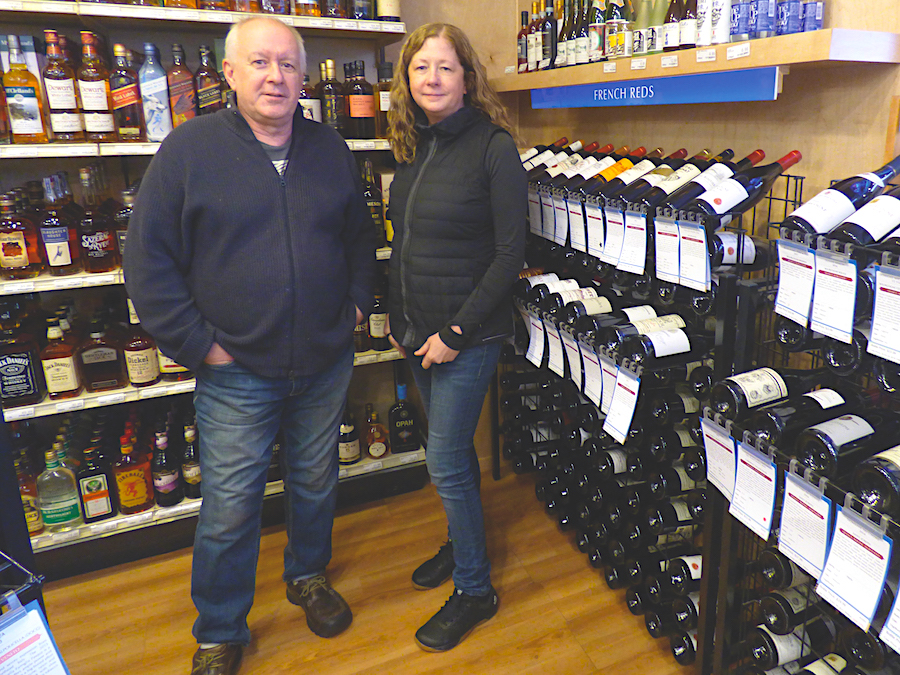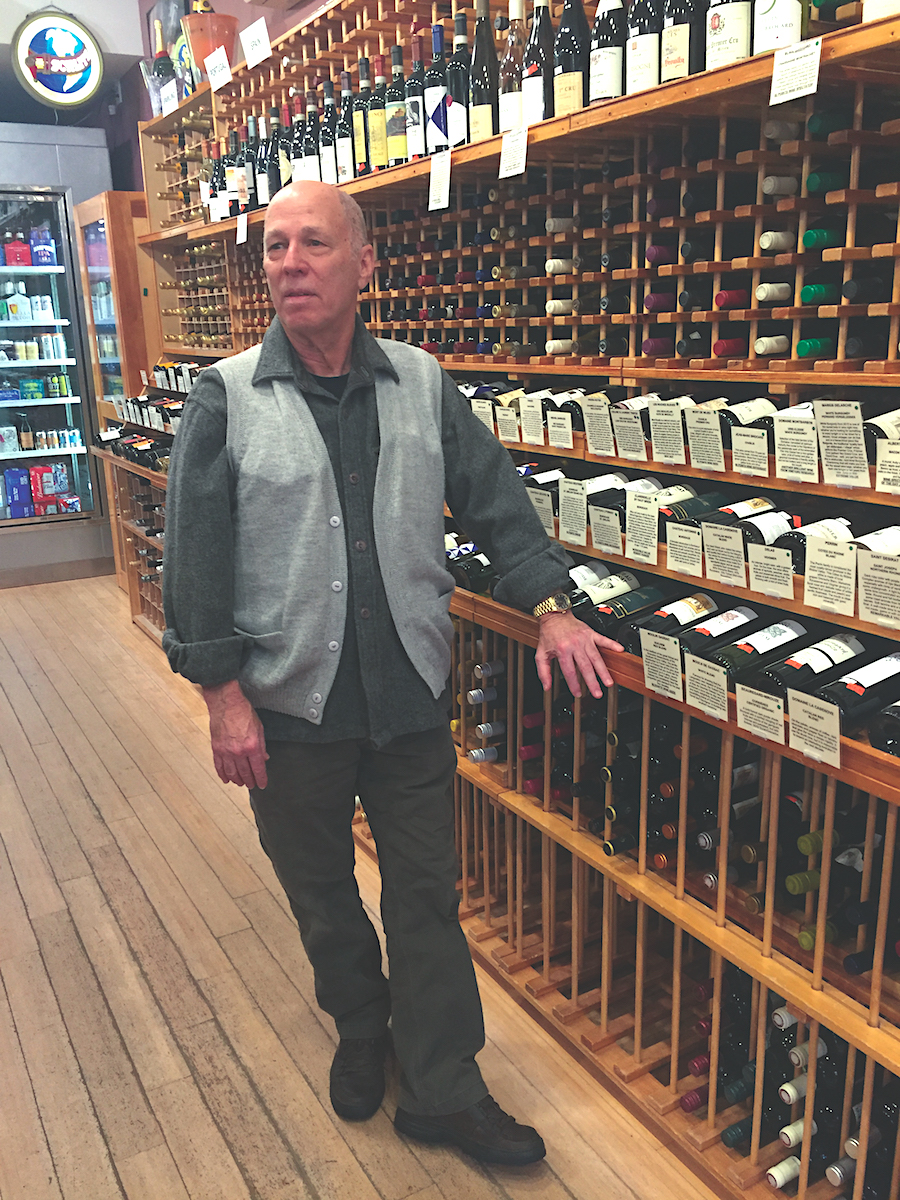On Outer Cape Cod, mom-and-pop shops famously reflect their owners’ personalities. That’s true, say local liquor store owners, even when what’s for sale — beer, wine, and spirits — is mostly made far away.
Rule changes that will allow liquor chains to expand, combined with a ballot initiative proposed by Cumberland Farms for the 2020 state election, is a one-two punch some are worried about.
Most of the Outer Cape’s liquor stores are independents. But Leslie and Kevin Plumb, who own Town Center Wine & Spirits in Eastham, are afraid chains like Liquor ’N More and Luke’s Super Liquor Stores are moving in on independent stores.

Leslie said she has been receiving monthly inquiries from one chain, which she would not name, asking about purchasing the couple’s store.
“We said we have absolutely no interest to sell,” she said.
Liquor ’N More opened on Route 6 in Wellfleet in 2010 after buying the Wellfleet Wine Cellar & Spirits. The chain, which has six stores in Massachusetts, recently purchased Orleans Wine and Spirits, in the same plaza as Shaw’s.
Limits on the number of licenses that can be held by one retailer are what has kept the growth of chains in check. But a compromise struck between package stores and the chains in 2011 raised that limit from three to seven. The limit will become nine in January.
A Law That Can’t Count
Cumberland Farms is behind another major change that could come in 2020. A ballot question initiated by a petition from the company would create an entirely new class of licenses for food stores.
The language in the initiative creates its own logic. The licenses, it says, “shall not be included as a license for purposes of determining the number of licenses allowed” under existing provisions. This would apply to the sale of wine and malt beverages to be consumed off premises.
The ballot question has already been challenged. In November the Mass. Package Stores Association, known as MassPack, filed suit against the state claiming that the Cumberland Farms−backed initiative should not have been certified because it violated the subject matter rules established in the state constitution.
MassPack, which represents independently owned retail liquor stores, argues that the ballot question creates a monopoly for large convenience stores, chains, and supermarkets.
Cumberland Farms is based in Westborough and operates 567 convenience stores in seven northeast states and Florida, according to conveniencestorenews.com. In October, Cumby’s was acquired by British retailer EG Group. Cumberland Farms declined to comment when contacted by the Independent, but the Boston Globe reported in August that the company said it was “prepared to go all the way if necessary.”
What’s in a Price?
While chain stores can’t compete on charm, the conventional wisdom is that they compete on price. Eastham’s Kevin Plumb pushed back on that idea, saying that while customers may be lured in by deals on familiar “commodity brands” other prices at chain stores are high.
What independent stores offer, he says, is a selection of drinks that reflect the owner’s informed taste.
“We have a very careful, curated selection,” Leslie said. “We put an enormous amount of effort into it,” said Leslie. Some bottles are pricey, others are not, she said, but whatever you pick is a good value. The couple, who have earned various certifications in wine expertise, write their own “shelf talkers” — those little blurbs that tempt you to pick up a particular bottle.
The store was first opened by Leslie’s father — his store and the Eastham Superette were the only liquor stores in town back then — and it’s been in their family for more than 50 years.

Provincetown has yet to see a liquor store chain, but it could be on the horizon, Jerry Swartz said. He operates Glass Half Full, a shop on Commercial Street owned by the Yingling family.
“We’re all facing the same thing,” Swartz said. But if a buyer came knocking he wouldn’t be totally opposed. “If the money’s right, of course,” he said.
Swartz described his store as “Eurocentric,” with a good many bottles from the Rhone, Burgundy, and other regions of France.
Swartz, too, says value is different from price. If the wine is no good, it doesn’t matter if it’s cheap, Swartz said: “The basis of this store is to offer better wines at better prices than other stores in the area.”
Swartz likes to work with smaller distributors. That, he said, is how he brings in wines he really wants, not what’s being pushed by someone else.
One thing that eases Swartz’s concerns about chain stores: the climate emergency. Flooding might deter chains from going after Commercial Street businesses, he said. During the spring storm of 2018, Glass Half Full was one of many stores that suffered losses. Swartz said water engulfed the basement.
‘They’ll suck at it’
Alan Kogos, who has owned Seaside Liquors in Wellfleet for 30 years, said he doesn’t think chains will make it on the Outer Cape. Though, he added, “It would be sad if that happened.”
Alcohol sales at Cumberland Farms or Stop & Shop could save some people a trip to the liquor store while they’re getting gas or grocery shopping. But as for finding wines that are good values, Kogos said those stores can’t make the same selections the independents can.
“I think they’ll suck at it,” Kogos said.
Kevin Plumb agreed.
“Eventually it could be good for us,” he said. “We’ll become known as a real fine wine store — even though we already are.”
Editor’s note: In a previous version of this article we incorrectly identified Liz White as a vice president of Cumberland Farms. She is vice president of Kel & Partners, a public relations firm that works for Cumberland Farms.



